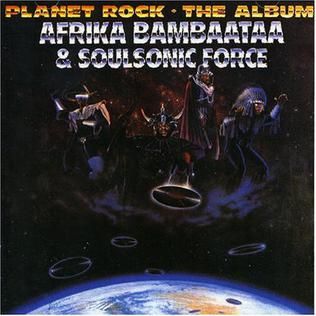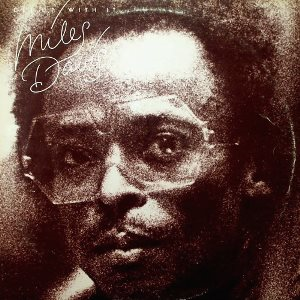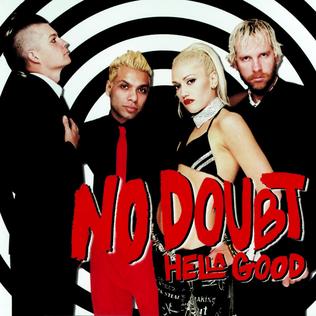The new school of hip hop was a movement in hip hop music, beginning in 1983–84 with the early records of Run–D.M.C., Whodini, and LL Cool J. Predominantly from Queens and Brooklyn, it was characterized by drum machine-led minimalism, often tinged with elements of rock; rapped taunts, boasts, and socio-political commentary; and aggressive, self-assertive delivery. In song and image, its artists projected a tough, cool, street b-boy attitude. These elements contrasted sharply with funk and disco, novelty hits, live bands, synthesizers, and party rhymes of artists prevalent in the early 1980s. Compared to their older hip hop counterparts, new school artists crafted more cohesive LPs and shorter songs more amenable to airplay. By 1986, their releases began to establish hip hop in the mainstream.

Let's Take It to the Stage is the seventh album by American funk rock band Funkadelic. It was released in April 1975 on Westbound Records. The album charted at number 102 on the Billboard 200 and number 14 on the R&B Albums.

Planet Rock: The Album is an old school hip hop album by Afrika Bambaataa & Soulsonic Force, released in 1986 as a collection of previous singles. The song "Planet Rock" was one of the earliest hits of the hip hop music genre and remains one of its pioneering recordings. The single's liner notes include members of Kraftwerk with the songwriting credits. In creating the track, portions of Kraftwerk's "Numbers" and "Trans-Europe Express" were interpolated, along with portions of songs by Captain Sky and Ennio Morricone.

Get Up with It is a compilation album by American jazz trumpeter, bandleader, and composer Miles Davis. Released by Columbia Records on November 22, 1974, it compiled songs Davis had recorded in sessions between 1970 and 1974, including those for the studio albums Jack Johnson (1971) and On the Corner (1972). In The Rolling Stone Album Guide (2004), J. D. Considine described the compilation's music as "worldbeat fusion".

Tutu is an album by American jazz trumpeter Miles Davis, released in 1986 by Warner Bros. Records. It was recorded primarily at Capitol Studios in Los Angeles and Clinton Recording in New York, except the song "Backyard Ritual", which was recorded at Le Gonks in West Hollywood. Davis received the 1986 Best Jazz Instrumental Performance, Soloist Grammy Award for his performance on the album.

In the City is the debut studio album by British band the Jam. Released in May 1977 by Polydor Records, the album reached No. 20 on the UK Albums Chart.

"Hella Good" is a song by American rock band No Doubt from their fifth studio album, Rock Steady (2001). Written by Gwen Stefani, Tony Kanal and the Neptunes, and produced by Nellee Hooper and the band, "Hella Good" was released as the album's second single on March 11, 2002, and received positive reviews from contemporary music critics, who made comparisons to the work of a diverse range of artists such as Afrika Bambaataa and Madonna.

"Renegades of Funk" is a song written by Afrika Bambaataa, Arthur Baker, John Miller & John Robie and recorded by Afrika Bambaataa & Soulsonic Force. Released in 1983 as a single on the Tommy Boy label, it was also included on the 1986 album Planet Rock: The Album. The song is an eclectic fusion of electronic music and heavy percussion, with politically fused hip hop lyrics that draw a connection between past revolutionaries and bohemians to present-day street artists. It was produced and mixed by Arthur Baker and John Robie. Mastering was by Herb Powers Jr..

Escape is the second studio album by American hip hop group Whodini, released on October 17, 1984 by Jive Records. The album was recorded at Battery Studios in London, where the group worked with producer Larry Smith after their management could not find them a producer. Whodini member Jalil Hutchins convinced Smith, his friend, to produce the album when Smith needed money after a friend's hospitalisation. Although the group originally intended to record more rock-oriented material for the album, its music has a predominantly synthesizer-based backing, with a rhythm and blues influence.

Power is the second studio album by American rapper Ice-T, released on September 13, 1988 by Sire Records. Recorded at Syndicate Studios West in Los Angeles, the home studio of DJ Evil E, it was produced by Ice-T and Afrika Islam. The Los Angeles Daily News noted that its lyrical themes ranged from sex to gun violence, and that Ice-T "implicates everyone from radio programmers to the police as accomplices in the decline of western civilisation." The album contains lyrics which began a feud between Ice-T and rapper LL Cool J. The album cover, which features Ice-T's then-girlfriend Darlene Ortiz, Ice-T, and DJ Evil E, was described as "perpetuating stereotypes" by the Chicago Tribune and "violence-glorifying" by both the Chicago Sun-Times and The Sydney Morning Herald.

"Planet Rock" is a song by the American hip hop artists Afrika Bambaataa and the Soul Sonic Force. The song was produced by Arthur Baker and released by Tommy Boy Records in 1982. The recording came together after DJ and producer Baker met with Bambaataa and the two bonded over the idea of creating a song about their mutual appreciation for the band Kraftwerk. Baker and Bambaataa had worked together previously on the song "Jazzy Sensation" and decided to compose a more electronic based version of the hip hop song, as opposed to the more disco-oriented work popular at the time. Along with musician John Robie, the group recorded the single at Intergalactic Studios in New York. Robie duplicated the sound on the record and had Bambaataa's rappers in the Soul Sonic Force rap over it. To create the raps, the lyricist of the group, Emcee G.L.O.B.E., had to develop a style he called "mc popping", which involved rapping off time, an unusual style at the time.

"Looking for the Perfect Beat" is a song by Afrika Bambaataa & the Soulsonic Force. The song was produced by Arthur Baker and John Robie and was the follow-up track for the group following "Planet Rock". The track took much longer to develop than "Planet Rock" with Baker using cocaine and the pressure involved with creating a follow-up single. The group was developed for months in Robie's apartment while Afrika Bambaataa and the Soul Sonic Force were touring.

"It Began in Afrika" is a song by British electronic music duo the Chemical Brothers. It was released as the first single from their fourth album Come with Us on 10 September 2001. Originally named "Electronic Battle Weapon 5" and released for DJs as a white label in June 2001, "It Began in Afrika" became a hit in clubs and was renamed for its official release. The song contains vocal samples from the track "Drumbeat" by American musician Jim Ingram, who was given a writing credit.

"Rock Box" is a song by the American hip hop group Run-DMC. The song was produced by Larry Smith and Russell Simmons and released by Profile Records in March 1984. Following the popularity of their previous two singles "Hard Times" (1983) and "It's Like That" (1983), Profile Records head suggested to the producers and group that they should attempt to record an album as they already had four songs ready, and releasing a few more would not hurt them. Despite speculating low sales from the label and the group not feeling that hip hop was a genre appropriate for a full-length album, they were given an advance to start recording. This led to Run-DMC members Joseph "Run" Simmons and Darryl "DMC" McDaniels going through their rhyme book to develop new songs, one of which would become "Rock Box".

"Red Alert" is a song by English electronic music duo Basement Jaxx. It was released on 19 April 1999 by record label XL as the first single from their debut album, Remedy (1999). The vocals from the track were provided by Blu James. It reached number five on the UK Singles Chart and became their first number-one hit on the US Billboard Hot Dance Music/Club Play chart. As of July 2019, the single has sold 400,000 copies in the United Kingdom, allowing it to receive a gold certification from the British Phonographic Industry (BPI).

Lance Taylor, also known as Afrika Bambaataa, is an American DJ, rapper, and producer from the South Bronx, New York. He is notable for releasing a series of genre-defining electro tracks in the 1980s that influenced the development of hip hop culture. Afrika Bambaataa is one of the originators of breakbeat DJing.

Looking for the Perfect Beat: 1980–1985 is a compilation album by hip hop musician Afrika Bambaataa.

Rhythm Killers is an album by Jamaican musical duo Sly and Robbie, released in May 1987 by Island Records. By the time of the album's recording, Sly and Robbie had transitioned away from their prolific work in the reggae genre. They spent the 1980s experimenting with electronic sounds and contemporary recording technology on international, cross-genre endeavors, which influenced their direction for Rhythm Killers.

The Light is a 1988 studio album released by Afrika Bambaataa and Family. The album features other stars of the 1980s, such as UB40, Jaki Graham, and Boy George. The lead single "Reckless" features UB40 and was a Top 20 hit in the UK peaking at #17. The album itself didn't chart in the UK.
The following is a list of albums released by record label Tommy Boy Records.


















